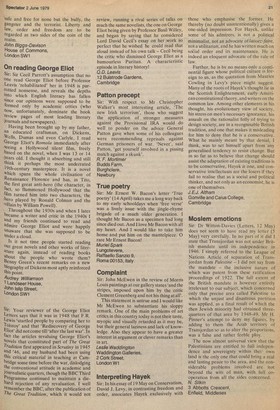Interpreting Hayek
Sir: In his essay of 19 May on Conservatism, David J. Levy, in contrasting freedom and order, associates Hayek exclusively with those who emphasise the former. He thereby (no doubt unintentionally) gives a one-sided impression. For Hayek, unlike some of his admirers, is not a political minimalist, not an advocate of laissez-faire, not a utilitarian, and he has written much on social order and its maintenance. He is indeed an eloquent advocate of the rule of law.
Further, he is by no means only a continental figure whose political culture is foreign to us, as the quotation from Maurice Cowling in Levy's piece might suggest. Many of the roots of Hayek's thought lie in the Scottish Enlightenment, early American constitutional theory, and writers on the common law. Among other elements in his thought, his evolutionary view of society, his stress on men's necessary ignorance, his assault on the rationalist folly of trying to design society, are in a recognisable British tradition, and one that makes it misleading for him to deny that he is a conservative. What he mainly meant by that denial, I think, was to set himself apart from any generalised tendency to resist change. But in so far as to believe that change should assist the adaptation of existing traditions is to be conservative, Hayek is one, and conservative intellectuals are the losers if they fail to realise that as a social and political thinker, and not only as an economist, he is one of themselves.
J.E.J. Altham Gonville and Caius College, Cambridge






































 Previous page
Previous page